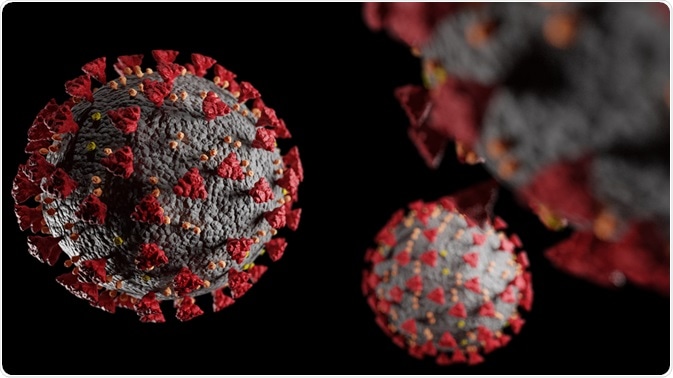Breastfeeding and COVID-19
Since its identification in December of 2019, severe acute respiratory syndrome coronavirus 2 (SARS-CoV-2) has continued to spread rampantly around the world and remains a major threat to worldwide public health. The novelty of SARS-CoV-2 raises serious concerns regarding the vulnerability of nursing mothers and whether they can transmit the infection to their babies during breastfeeding.

Image Credit: Pixel-Shot/Shutterstock.com
Maternal health and COVID-19
Previous outbreaks that have occurred throughout history suggest that maternal and neonatal outcomes may be at a higher risk of unfavorable outcomes following exposure to SARS-CoV-2. Although pregnant women have not been identified as a population at risk during the current pandemic, these individuals may still be vulnerable to more severe effects if infected with SARS-CoV-2.
Since pregnant women often experience physiological changes to both their immune and cardiopulmonary systems, this population may be more susceptible to respiratory illnesses like that which can arise following infection by SARS-CoV-2.
SARS-CoV-2 has been found to directly infect cells through its interaction with the angiotensin-converting enzyme 2 (ACE2) receptor. During pregnancy, ACE2 receptor levels are upregulated, which accounts for the relatively low blood pressure levels that pregnant women will experience.
As a result of this increased expression of ACE2, pregnant women may be at a higher risk of developing serious complications from SARS-CoV-2 expression. As the clinical situation continues to develop, both the short- and long-term effects that COVID-19 has on maternal, fetal, and neonatal outcomes have yet to be fully determined.
Can SARS-CoV-2 enter breast milk?
One major concern that has emerged during this pandemic surrounding maternal health is the possible transmission of COVID-19 through breast milk. To date, there is limited published data that has found that COVID-19 is present within the breastmilk of positive mothers; therefore, there is limited evidence available to advise mothers against breastfeeding their babies unless the mother is acutely ill.
However, it should be noted that one study confirmed the presence of positive viral nucleic acid in one breast milk sample out of a total of 7 breast milk samples obtained from women who were positive for COVID-19. The same sample that was found to be positive was retested two days later and was subsequently identified as negative for COVID-19.
Breastfeeding mothers are therefore advised to practice respiratory hygiene during feeding, wear a mask, wash their hands immediately prior and after touching the baby, and routinely clean and disinfect any surfaces they may have come in contact with.
Since the potential for COVID-19 transmission through breast milk appears to be low, it is crucial that positive mothers strictly abide by these additional precautions, as they can still transmit the virus to their young babies through respiratory droplets and/or skin contact during breastfeeding.
Can breast milk help prevent COVID-19 in babies?
Human breast milk contains a wide range of soluble and cellular antimicrobial substances that contribute to the development and maturation of the immune system in infants. Although some of the substances found in breast milk could be beneficial to newborns during COVID-19, researchers maintain that there must be a balance between the protective inflammatory substances and those that modulate inflammation to protect the newborn against infection.
Some anti-inflammatory substances that are found in human breast milk include osteoprotegerin, which has been suggested to reduce the inflammatory response by preventing tumor necrosis factor (TNF)-induced inhibition of T cells.
Another anti-inflammatory substance found in human breast milk is lactoferrin, which has been shown to reduce the production of proinflammatory cytokines. Epidermal growth factor (EGF) has similar anti-inflammatory properties and can be found in higher concentrations in preterm milk as compared to full-term milk.
Aside from the inherent properties of breast milk, one recent study points to the potential transmission of SARS-CoV-2 antibodies from a previously positive mother to their infants. In this work, breast milk samples were obtained from 14 patients who delivered their babies while being hospitalized with COVID-19.
While none of the breast milk samples were found to be positive for COVID-19, neutralized SARS-CoV-2 antibodies were identified in three of the samples. Despite this promising data, further work must still be conducted to determine whether the presence of SARS-CoV-2 antibodies within breast milk has a protective effect on breastfed infants.
Neonatal health and COVID-19
Infants under the age of one month are at particular risk of experiencing the severe effects of COVID-19 as a result of immature host defense mechanisms. However, recent studies point to a potential advantage that the naïve neonatal immune system has in its inability to produce the cytokine storm that has been linked to many of the severe and even fatal results of COVID-19.
Additionally, the cells present within children’s lungs express this receptor much less than that which is present in the lungs of adults, which suggests one reason why infection by SARS-CoV-2 typically affects children less severely.
Even so, the uncertainty surrounding the effects of COVID-19 perpetuates the critical need to protect the neonatal population from any potential exposure to SARS-CoV-2, including that which might arise during breastfeeding. A recent study conducted by the United States Centers for Disease Control found that infants had a significantly higher hospitalization rate as compared to any other child group, with 62% of the infant population of 95 patients being hospitalized.

Image Credit: narci5/Shutterstock.com
References and Further Reading
- Giuliani, C., Li Volsi, P., Brun, E., et al. (2020). Breastfeeding during the COVID-19 pandemic: Suggestions on behalf of woman study group of AMD. Diabetes Research and Clinical Practice 165. doi:10.1016/j.diabres.2020.108239.
- Gao, X., Wang, S., Zeng, W., et al. (2020). Clinical and immunological features among COVID-19 affected mother-infant pairs: antibodies to SARS-CoV-2 detected in breast milk. New Microbes and New Infections. doi:10.1016/j.nmni.2020.100752.
- Green, J., Petty, J., Bromley, P., et al. (2020). COVID-19 in babies: Knowledge for neonatal care. Journal of Neonatal Nursing 26(5); 239-246. doi:10.1016/j.jnn.2020.06.005.
- Narang, K., Enninga, E. A. L., Gunaratne, M. D. S. K., et al. (2020). SARS-CoV-2 Infection and COVID-19 During Pregnancy: A Multidisciplinary Review. Mayo Clinic Proceedings 95(8); 1750-1765. doi:10.1016/mayocp.2020.05.011.
- Wu, Y., Liu, C., Dong, L., et al. (2020). Coronavirus disease 2019 among pregnant Chinese women: case series data on the safety of vaginal birth and breastfeeding. BJOG: An International Journal of Obstetrics and Gynecology 127(9);1109–1115. doi:10.1111/1471-0528.16276.
Further Reading
- All Coronavirus Disease COVID-19 Content
- What Mutations of SARS-CoV-2 are Causing Concern?
- What is the Clinical Impact of COVID-19 on Cancer Patients?
- Can Pets Get COVID-19?
- An Overview of the SARS-CoV-2 Vaccines
Last Updated: Jan 20, 2021

Written by
Benedette Cuffari
After completing her Bachelor of Science in Toxicology with two minors in Spanish and Chemistry in 2016, Benedette continued her studies to complete her Master of Science in Toxicology in May of 2018.During graduate school, Benedette investigated the dermatotoxicity of mechlorethamine and bendamustine, which are two nitrogen mustard alkylating agents that are currently used in anticancer therapy.
Source: Read Full Article
